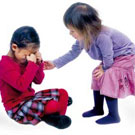January’s edition of Quadrant has an interesting article by a lapsed Catholic about the clerical abuse scandal: ‘Father Scapegoat,’ by Joe Dolce.
(That link will take you to the article in its entirety, which surprises me. I thought you’d have to buy the magazine! It’s worth subscribing to Quadrant. It’s good for the life of the mind — your own specifically, and Australia’s more broadly.)
Anyway, Joe Dolce’s missive teems with insights. His recollection of prurience in the confessional is mortifying, and thankfully alien to my own experience. His perception of the Catholic priesthood’s “unique spiritual cul-de-sac” is enlightening. And his exposition of the sexual abuse of children in contemporary society is horrifying.
The article makes excellent reading, and I recommend it to everyone.
But I take issue with Dolce’s critique of the Church’s media response. I agree with him that the press has engaged in an irrational and dishonest campaign against the Church. I get what people mean when they suggest “the Church should thank the media.” Without external pressure, internal reform seldom occurs. It’s impossible to thank the media though, when its anti-Catholic prejudice blinds it to abuse occurring elsewhere, and hinders responsible debate about where popular culture has gone wrong.
The pedophile priest, Dolce writes, has become the scapegoat. All our guilt and blame is projected onto him (and the Catholic Church by association and implication), and everyone else is absolved. Dolce cites a slew of studies which demonstrate that the problem is much larger than the Church. And he wonders why more Catholics don’t speak up and refute media distortions.
I think there are a few answers to that. I think some Catholics are so mortified by the scandal, that they now tune out of the media coverage, and hope for the day the storm passes. And I think many Catholics are mortified by the hierarchy’s inadequate response to victims, and are loathe to defend the Church’s record on this issue, even in the face of media mendacity.
And then there is Dolce’s appeal to a martyr complex:
Unfortunately, there is also a historical proclivity amongst some Catholic clergy—an almost suicidal romantic yearning—for martyrdom, in the spirit of the martyrdom of Jesus. The contemporary Catholic saint Maximilian Kolbe once said that he looked forward to being sent to “heathen” Japan where if priests were fortunate they might be martyred for their beliefs. To me, that is passive and cowardly. Real martyrdom would be more along the path of the social activist, the path that Jesus actually walked, speaking out against the lie and taking whatever consequences.
Dolce’s greatest strength is also his greatest weakness. His outside view affords him refreshing insights into the popular perception of the celibate priest. But it prevents him from understanding an authentically faithful response to the Gospel.
Just such an account is provided, however, by Fr Ron Rolheiser’s ‘On Carrying A Scandal Biblically.’ (A survivor of sexual abuse read this article and recommended it to me. They quibbled over minor points, but from their perspective the sum of it is excellent.)
Rolheiser suggests that the Church’s response to the sexual abuse scandal should be focused exclusively on healing:
To carry this scandal biblically means too that healing, not self-protection and security, must be our real preoccupation. Sometimes for bishops, provincials, religious superiors, and church officials there’s a real (and understandable) danger of losing perspective in the face of accusations of sexual abuse. Many times, in fact, we have lost perspective.
In the vortex this crisis, what has to be our primary preoccupation? To protect the innocent and to bring about healing and reconciliation. Everything else (worries about security, lawsuits, and the like) must come afterwards.
Rolheiser echoes Dolce’s claim that the pedophile priest, even the Church, has become a scapegoat. But where Dolce sees an outrageous injustice which must be put right, Rolheiser sees an outrageous injustice and prophetic opportunity:
Right now priests represent less than one per-cent of the overall problem of sexual abuse, but we’re on the front pages of the newspapers and the issue is very much focused on us. Psychologically this is painful, but biblically this is not a bad thing: The fact that priests and the church have been scapegoated right now is not necessarily bad. If our being scapegoated helps society by bringing the issue of sexual abuse and its devastation of the human soul more into the open, than we are precisely offering ourselves as “food for the life of the world”, and we, like Jesus in his crucifixion, are helping to “take away the sins of the world.”
. . This is not a distraction to the life of the church, it’s perhaps the major thing that we need to do right now for the world and our culture. There are very few things that we are doing as Christian communities today that are more important than helping the world deal with this issue. If the price tag is that we are humiliated on the front pages of the newspapers and that the Anglican, United, and Roman Catholic Churches of Canada end up financially bankrupt, so be it. Crucifixions are never easy and they exact real blood! It might well be worth it in the long run if we can help our world come to grips with this.
I can see why the world might call this a martyr complex. But it strikes me as profoundly supernatural in its outlook. Which is another way of saying that far from being passive and cowardly, it is good and true.






I agree with your response. What I did not like about Joe Dolce’s article is that it is essentially a longish variation on the theme “Hey, stop criticising us, we’re not the only ones!”
It is precisely this species of defensiveness that is twisting the knife, figuratively speaking, into those who suffered directly from the betrayal and abuse and those who loved them, and which is impeding the very healing which Father Rolheiser mentions.
Of course it is a fact that sexual abuse and emotional abuse and the abuse of institutional power is to be found elsewhere than simply in the Catholic Church. But saying so – in defense or reaction – amounts to a retreat from or denial of that full-hearted compassion and passion for justice and the paramountcy of the victims which they need to hear and feel and be supported by.
It’s a case of “don’t let love get in the way of facts!”. The Christian way, as you suggest in another way, is “don’t let facts get in the way of love”. (And I mean ‘real’ love, not superficially).
I like Father Rolheiser’s focus on healing because he does not see that as a feint or blind or side-step from confronting the ugly truth of the matter, but as an essential condition for actually seeing the ugly truth as it is. And the ugly truth comprises, not just the crime of sexual and emotional abuse and rape etc, but even more, the failure of those who were in a position to do something about it and conceal or downplay the problem.
Like you, Father John, I do not see the robust acceptance of all the pent-up criticism of the Church over this as a “martyr complex”. I see it as courage, honesty, responsible and necessary. Not attempting to deflect or counter the shame or criticisms would be better characterised as a “George Washington” complex (i.e. “I cannot tell lie; I chopped the cherry tree”).
Joe Dolce’s article is precisely the wrong article at the wrong time (if at any time). I have read the Whitlam report and Bishop Michael Kennedy’s statement. The first is clarifying and enlightening and shows that with the emergence of the truth, the heat and confusion of alarm, prejudice and speculation can and will be softened. The second is hope-filling, because I think the new Bishop’s statement is essentially unqualified.
We all know that there are good priests and brothers etc doing hard yards day in and day out, and they suffer the shame of the stigma; they have been effectively betrayed by some of their peers and higher-ups. The exposure of the extent of sexual abuse crimes and the exposure of past policies placing reputation before justice and protection will hopefully bring reparation and new responsible relationships and structures in the Church.
But only if the hurt, shame and pain of the people is embraced unflinchingly, like (dare I say it?) Jesus embraced his cup and cross.
I think you’re too hard on Joe Dolce Stephen. He makes claims which need to be uttered, though I would add that when they’re uttered by some people they do more harm than good. But I don’t think Dolce is one of those people. We should take seriously his claim that he is “well and truly lapsed,” which diminishes the charge that he’s just another defensive Club Member.
I hadn’t read Bishop Kennedy’s letter until you recommended it. What a refreshing change! Thanks for the tip.
I’ll respond to your question, Fr John.
This crisis affords an opportunity for teaching someone something about the Gospel of Life and about the Church as hospital for sinners.
The acceptance of contraception logically ends up in perversion and even bestiality because sexual activity is separated from procreation and if pleasure is the sole aim, it gets more and more demanding and plunges into violence.
The vast failure of Church leaders to preach against contraception has led to an inability to discern that some men are unsuitable for the seminary and religious orders.
Try offering this to someone who sneers at you whilst jeering about paedophile priests: “Yes, it’s appalling, I absolutely agree. But did you know this has all happened because of contraception? And furthermore, the vast majority of these blokes were actually homosexuals who went for pre-pubescent and pubescent boys? Awful, aint it?”
Still nobody preaches against contraception, so the abuse, I believe, will continue… it seems to be a kind of self-inflicted punishment.
I hasten to add this view is partly that of Dr Martin Brenner, an Orthodox Jew who converted to Catholicism in the 70s. He is a scriptural scholar, a father of nine and believes the sky is in pieces at our feet — because of contraception.
You can find his lectures on the subject on the internet.
I agree with you MuMu. No sin is exclusively private, and every sin inflicts damage on the Church. Humana Vitae is prophetic in its warnings on what contraception does to society.
But it doesn’t explain everything. It doesn’t account for the shameful treatment of victims’ families, who were treated as personae non gratae by people who knew that they were telling the truth! The coverup is, I think, a greater scandal than the abuse itself, because it allowed the abuse to occur at an enormous scale, and the refusal to believe victims — or even meet them on many occasions — exacerbated their affliction.
The contraceptive mentality has resulted in the destruction of society, pure and simple. The failure of Catholic Church leaders to enunciate the Church’s teaching on the evils of the contraceptive mentality has resulted not only in predatory homosexual and pedophiliac crimes but, of course, the inability of said leaders (who have failed to preach on ….etc) to bring about justice. Of course they have – it goes with the whole anti-life territory! I don’t agree the cover up is worse than the abuse; it is simply the other side of the coin.
How much time was spent in the seminary on the foundational evil of contraception, fornication and its vast and profound evil effects on society? Any time on how you must preach about it?
Before Vatican 2, schools, parishes, missions spent a fair amount of time preaching and teaching on the subject. Now – silence.
Any loving and healing approach to this (or any) issue can only be one which is based on truth (i.e. reality). This includes both the truth about the crimes committed and their full evil, and (in principle) also the truth in defence against unjust claims made about the Church /clergy / hierarchy as a whole. How much this latter can realistically be achieved in given circumstances, and how much it is counterproductive, is a matter for prudent discernment. This particular article by Dolce seems to me helpful on balance.
Not all victims and their families think the same way, not all of them are helped to find peace by having this issue dragged up again and again, not all of them are happy to see the Church dragged through the mud to the maximum degree. Approaching this masochistically is not necessarily pro-victim. Those who have suffered from these crimes can still appreciate the distinction between those individuals responsible and those who are innocent.
One of the aggravating factors in abuse by clergy is precisely the robbing of the victim’s spiritual heritage. In principle, we exacerbate this destruction of spiritual heritage by tacitly conceding the claim that the Church is somehow fundamentally flawed.
I am probably a believing Catholic today partly because years before I was born, a disillusioned teenager decided not to let her own suffering of abuse destroy her faith. For my own sake, I thank God that she became a great defender of the Church.
In our own minds at least, we should be clear about what we are doing in defending the Church. It is not ‘self-protection’, the Church is not some dodgy tobacco company that if we were decent we would actually abandon or wind up, it is not some ‘club’ we are selfishly ensconced in. Rather, the Catholic Church is God’s way of salvation for every human being, and which every human being is ultimately called by God to be part of. Abandoning her defence would be immoral and anti-human.
As far as each of us personally is concerned, being the victim of unjust slurs on account of remaining faithful to Christ in his Church is actually occasion for great rejoicing (Lk 6:22-23). So our personal ‘selfish’ benefit is not the motivation for defending God’s Church. We prudently defend the Church’s reputation (avoiding, of course, illegitimate means e.g. cover-ups), for the sake of those who otherwise might, to their ruin, abandon her or never find her. The defence of the Church against unjust attacks is a work of mercy.
Thanks Fr Justin. This is an important elaboration. It reminds me of an exchange between Screwtape and Wormwood in C.S. Lewis’ The Screwtape Letters.
Screwtape advises his nephew to foster a false humility in his patient by encouraging him to value claims independently of their truth. To judge them instead by the humility they convey, or compassion, or some other good. Claims can be judged by these values of course, but if truth is not the ultimate measure, confusion is sown, black can be called white, and evil can be called good.
Thanks Fr John. Funny, I think I already had Screwtape in the back of my mind when I wrote the first comment, but on other grounds…
On Dolce’s experience in the confessional, it’s good to note that the type of questioning he mentions was expressly forbidden by the pre-1983 Code of Canon Law (Canon 888.2). (The 1983 Code takes it up in more general terms (Canon 979).) It would appear likely that the particular confessor had ‘problems’ of his own…
And on Rolheiser’s hope that the scapegoating of priests may be redemptive for society in raising awareness of sexual abuse more generally…well, I believe that from every evil God always brings a greater good, but I’m a little sceptical that it is coming by this particular route.
Excellent blog you have here but I was curious about if you knew of any user discussion forums that cover the
same topics talked about in this article?
I’d really love to be a part of online community where I can get advice from other experienced people that share the same interest. If you have any recommendations, please let me know. Cheers!